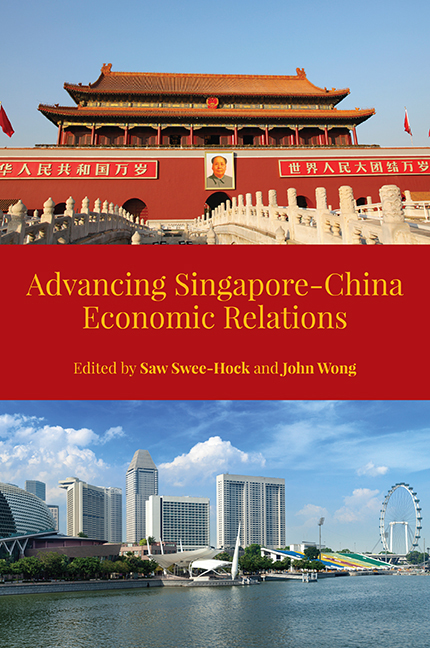Book contents
- Frontmatter
- Contents
- List of Tables
- List of Figures
- Preface
- The Contributors
- 1 Evolution of Singapore-China Economic Relations
- 2 The Political Economy of Singapore's Unique Relations with China
- 3 Suzhou Industrial Park: Going Beyond a Commercial Project
- 4 Translating Concept into Practice: Sino-Singapore Tianjin Eco-City Project
- 5 China's Foreign Direct Investment in Singapore since the 2000s
- 6 Singapore's Direct Investment in China since the 1980s
- 7 Singapore-China Trade and CSFTA
- 8 Growth of Tourism between China and Singapore
- 9 Enhancing Educational Collaborations between China and Singapore
- Index
8 - Growth of Tourism between China and Singapore
Published online by Cambridge University Press: 21 October 2015
- Frontmatter
- Contents
- List of Tables
- List of Figures
- Preface
- The Contributors
- 1 Evolution of Singapore-China Economic Relations
- 2 The Political Economy of Singapore's Unique Relations with China
- 3 Suzhou Industrial Park: Going Beyond a Commercial Project
- 4 Translating Concept into Practice: Sino-Singapore Tianjin Eco-City Project
- 5 China's Foreign Direct Investment in Singapore since the 2000s
- 6 Singapore's Direct Investment in China since the 1980s
- 7 Singapore-China Trade and CSFTA
- 8 Growth of Tourism between China and Singapore
- 9 Enhancing Educational Collaborations between China and Singapore
- Index
Summary
Introduction
Since China and Singapore established diplomatic relations in 1990, tourism has become one of the most important economic relations between the two countries. For Singapore, the tourism industry has played an essential role in supporting its economic development over the past few decades. In recent years, compared to tourists from Japan, South Korea, Taiwan and other Southeast Asian countries, Chinese tourists have become far more important. Indeed, as a result of rising income, the relaxation of travel restrictions, and more holiday periods, Chinese people have much more opportunities for travelling abroad. According to China National Tourism Administration (CNTA), 57.4 million Chinese travelled out of China in 2010. CNTA estimated that by 2015, there will be some 100 million Chinese travellers going abroad and spending approximately US$100 billion, making China the largest source of tourism in the world. Being one of the most important tourism hubs in the world, Singapore will benefit from this rising tide of Chinese tourists.
The emergence of Chinese tourists is not only lucrative for the Singaporean tourism sector but also imperative for China's domestic tourism industry's development. CNTA's figures show that the number of domestic tourists in China reached 2.1 billion in 2010, a 12 per cent increase from 2009, and generated 1.1 trillion Chinese yuan (about US$170 billion) of revenue for the industry. The Chinese government regards the tourism industry as strategically important because of its low resource consumption, abundant job opportunities, and great capability to promote the development of other industries. In 2009, China's State Council unveiled plans to boost the tourism industry, namely, “Opinions of the State Council on Accelerating the Development of Tourism Industry”. Domestic tourism was the main focus, followed by inbound tourism and outbound tourism. Chinese Vice-Premier Wang Qishan further highlighted in March 2011 that China would “strive to develop tourism into a strategic pillar industry of the nation's economy over the 12th Five-Year Plan period from 2011 until 2015”.
- Type
- Chapter
- Information
- Advancing Singapore-China Economic Relations , pp. 216 - 263Publisher: ISEAS–Yusof Ishak InstitutePrint publication year: 2014



